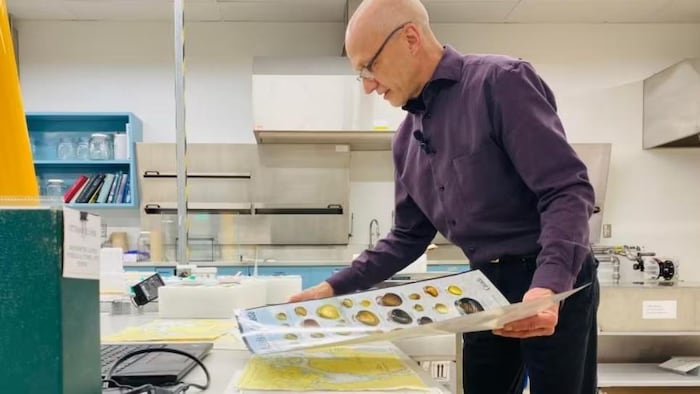Open in full screen mode Dr. André Martel in his laboratory at the Canadian Museum of Nature. Radio-Canada Speech synthesis, based on artificial intelligence, makes it possible to generate spoken text from a written text. Researchers at the Canadian Museum of Nature say a proposed nuclear waste storage facility could destroy the delicate balance of two endangered species living in the Ottawa River. Two closely related freshwater species thrive in one part of the river, but not elsewhere. Scientists say this delicate balance could easily be upset by a planned nuclear waste storage project near Chalk River Laboratories. Last month, the museum's Dr. André Martel dove an extraordinary segment of the Ottawa River, a 141-kilometer stretch around Lake Coulonge. The lack of hydroelectric dams, a fast current, naturally forming river sand dunes and the longest freshwater cave system in the country have made this place an Eden for an endangered wavy brown mollusk, the hickorynut.
It was in the Ottawa River that divers discovered one of the largest populations of hickorynuts in the country. (File photo)
Mr. Martel believes the delicate freshwater mussel population has a secret ally, an equally enigmatic and equally endangered fish: the lake sturgeon.
This fall, a research team made up of biologists from the museum, the Ministry of Fisheries and Oceans and the Ontario Ministry of Natural Resources and Forestry took a close look at sturgeon in the river near Westmeath, Ontario.
Loading
The SPVM launches an alert to find a one-year-old child
ELSE ON INFO: The SPVM launches an alert to find a one-year-old child
Part of their work was filmed in a Radio-Canada documentary for the show La Semaine Verte.
The research aims to prove that hickorynut larvae, called glochidia, hitchhike upstream on the gills of this massive, ancient fish.
The team found glochidia on the gills of sampled sturgeons, and last month Martel's lab interviewed DNA experts to determine whether the microscopic larvae are, in fact, the offspring of sturgeon mussels. #x27;obovarie.
Like any good scientist, Mr. Martel does not want to count his eggs before they have hatched, but affirms that he has good reasons to think that the sturgeon and the ;Olive Hickorynut live a secret buddy film under the waves, in this wild region of the Outaouais.
The Canadian Nuclear Laboratories have been managed since 2016 by SNC-Lavalin and four Anglo-American multinationals.
But there you have it: a proposed nearshore nuclear waste dump, upstream of Ontario's Chalk River, is causing serious concern. The SNC-Lavalin-led consortium is proposing an above-ground waste site just one kilometer from the river.
The Canadian Nuclear Safety Commission (CNSC) plan was rejected by the mayors of the Montreal region, whose millions of residents draw their drinking water from the Ottawa River, and by the Algonquins, who compared the proposal to build an outhouse next to a well.
We need to make sure we are aware of this what we do and what is at stake, argues André Martel.
Mr. Martel believes special protection is needed for the 141-kilometer segment where the fragile Hickorynut and ancient sturgeon work together to filter silt and bacteria from the water, acting as the kidney of the river.
The Hickorynut is one of 17 Canadian species of freshwater mussels that are in a situation of special concern, threatened or endangered. (File photo)
Katriina Ilves, an ichthyologist at the Canadian Museum of Nature – a marine biologist who studies different species of fish – called the sturgeon population in the Lake Coulonge region an important and enigmatic species.
I am concerned about any type of development that could lead to contamination of this water system, emphasizes Dr. Ilves.
< p class="StyledBodyHtmlParagraph-sc-48221190-4 hnvfyV">In an email, a CNSC spokesperson said he was unable to answer specific questions about the proposal and that the decision would probably only be made in a few weeks.
With information from Stu Mills, CBC News
Ontario is doing too little to protect woodland caribou habitat, denounces Ottawa

